The U.S. Department of Veterans Affairs’ (VA) Office of Mental Health and Suicide Prevention (OMHSP) and VA Midwest Health Care Network (Veterans Integrated Service Network [VISN] 23) has been working with academic researchers from the University of Pittsburgh’s Program Evaluation and Research Unit (PERU) to spearhead a community-based program as one of many efforts aimed at lowering the rate of Veteran suicide.
Aligned with the National Strategy for Preventing Veteran Suicide, the program, which began in early 2019, is designed to increase community involvement within VISN 23 by leveraging the reach and impact of local stakeholders.
“We recognize that just as suicide has no single determining cause, no single agency can prevent Veteran suicide,” said VA Secretary Robert Wilkie. “In working with our partners on this pilot program, we are adding new opportunities to provide our Veterans with whole-health solutions before they reach a point of crisis.”
Charged with carrying out the program’s multiple objectives, VISN 23 has deployed 10 education and outreach specialists, who have received formal training from VA leadership and PERU on how to:
- Assess community readiness for increased engagement efforts.
- Build local coalitions to facilitate wider and more frequent touchpoints with Veterans.
- Use community-specific public health data to tailor interventions to population needs.
- Provide metrics on program effectiveness to inform national implementation strategy.
Learn more about VA’s suicide prevention resources and programs at www.mentalhealth.va.gov/suicide_prevention. Veterans who are in crisis or having thoughts of suicide, and those who know a Veteran in crisis, can call Veterans Crisis Line for confidential support 24 hours a day, seven days a week, 365 days a year. Call 800-273-8255 and press 1, send a text message to 838255 or chat online at VeteransCrisisLine.net/Chat.
Media covering this issue can download VA’s Safe Messaging Best Practices fact sheet or visit www.ReportingOnSuicide.org for important guidance on how to communicate about suicide.
Topics in this story
More Stories
Be ready before a suicide crisis by learning about resources that are available. You don’t have to face it alone.
In a two-part series, Dr. Colleen Becket-Davenport discusses some common myths surrounding PTSD with Dr. Kelly Maieritsch.
In this episode of the PTSD Bytes podcast, we speak with with Dr. Greg Brown, Philadelphia VA clinical psychologist, about how safety planning can prevent suicide.







For non-emergency care, eligible Veterans can now go to approved neighborhood urgent care clinics.
https://news.va.gov/60896/va-mission-act-vas-new-urgent-care-benefit-for-veterans/
Instead of driving 20 miles to Dallas, I can now drive 3 miles for colds, flu, etc. This is a definite “win” for me.
This is a new program so there may not be an approved clinic nearby YET. Give the VA a chance to fully implement this program before dog-piling on them about lack of, or delayed, access to care.
Where is studies documentation located? Looks like you are trying to remove access to one type of suicide but not addressing root cause. Waste of time and money. Can we see studies documentation for review? I can see the anti_gun path of fixing the mechanism but not the root cause!
You make it sound like everything is OK with the VA I went this past Tuesday have appointment June 15 at 1pm so where is the improvement?
Yet they wonder why veterans commit suicide in va parking lots.